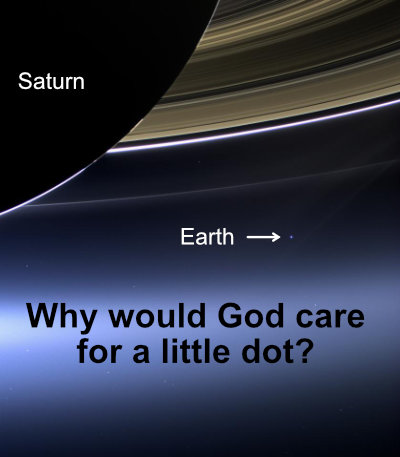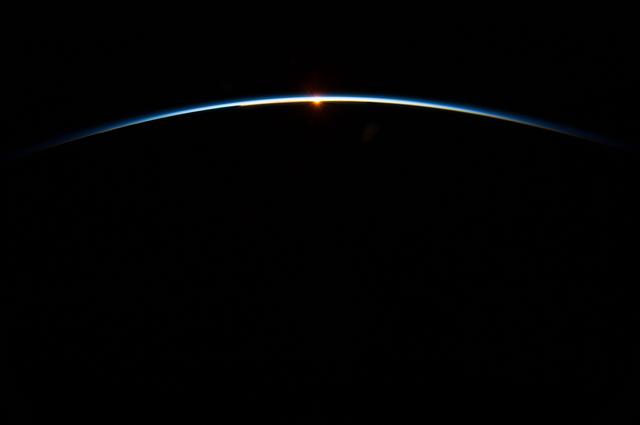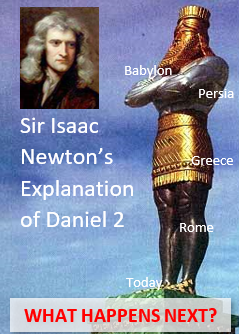A Tiny Dot of Significance
 King David, while writing Psalm 8:1-9, marveled that the God who created the mighty heavens cares for us tiny humans. The immensity of the universe, far from shaking his faith in God, gave him a greater appreciation of the value God has placed on us, and deepened his appreciation of our charge to care for the creatures and things of our planet. No doubt, he would have loved this image of our tiny speck of a planet taken from the Cassini-Huygens spacecraft from the vicinity of Saturn!
King David, while writing Psalm 8:1-9, marveled that the God who created the mighty heavens cares for us tiny humans. The immensity of the universe, far from shaking his faith in God, gave him a greater appreciation of the value God has placed on us, and deepened his appreciation of our charge to care for the creatures and things of our planet. No doubt, he would have loved this image of our tiny speck of a planet taken from the Cassini-Huygens spacecraft from the vicinity of Saturn! NASA Image and Video Library, ID: PIA17171
On February 4, 1990, Voyager I, one of two spacecrafts that had flown in tandem past Jupiter and Saturn sending us beautiful imagery of these planets, took a picture (see here) of Earth from beyond the orbit of Neptune—the farthest picture of Earth ever taken. (Voyager II, the other spacecraft, would go on to capture flyby imagery of Uranus, and Neptune). Traveling at the speed of light, the radio signals encoding the image took over 5 hours to traverse the 3.7 billion miles of space back to Earth. The image shows Earth as what has been called a “pale blue dot.” This image, and others like it—such as the spectacular images of the tiny dot of Earth captured by the Cassini spacecraft from Saturn—has inspired millions of people with the immensity of space compared to our tiny speck of a world, and has helped us rethink our boastful pride and our place in the universe.
But the image has also been urged as a reason to discount the existence of a God who created us, cares for us, and values us. Many have asked, "Even if there is a God, why would God care about us tiny people on this tiny speck of a planet in an unfathomably vast universe?” While it is part of our nature to desire and to even crave significance, we are told that significance is something we just have to manufacture for ourselves and that we should be satisfied with this.
But how can a valuation construct that has no foundation greater than our opinions satisfy? Do our friends, the neighbor next door, the despondent figure leaning hesitantly over the edge of a dark precipice have no more value than what anyone happens to ascribe to them at the moment?
The results of such thinking are devastating! If we are the ones who ultimately determine value, it follows that our ethics, and thus how we treat each other and our world, will be built on a foundation no less shaky than our ever changing and conflicting opinions.
The link between value and ethics is easily illustrated by contrasting a couple word pictures. Sawing a piece of wood in two, for example, is hardly an appalling act. Sawing a person in two is another matter entirely! We recognize that the value of a piece of wood is not at all comparable to the value of a person, and so sawing a person in two is not at all comparable to sawing a block of wood in two. But if we are the ones who ultimately determine the value of things, where does this recognition come from? Why does a person have immeasurably more value than a block of wood? While we sense that it is a self-evident fact, the current trend is to insist that there are no self-evident truths but rather only generally held opinions. But if we are the ones who ultimately determine the value of things, what happens when we disagree what that value should be? Who or what shall make that determination?
The majority consensus? Are the heinous atrocities performed by societies around the world over the course of human history justified because of societal consensus? Such a conclusion is deplorable to the sensibilities of all but the most hardened!
Utilitarianism? Perhaps, as some argue, the best ethics promotes the greatest good for the most people. However, how does one determine what the greatest good is, and to whom shall the responsibility of making that determination be given? The Nazis claimed that eliminating the physically and mentally handicapped and those regarded by the establishment as representing the “less favored races” would be a boon for society at large, and the results marked one of the saddest and most loathsome chapters of recent history.
What disincentive does the view that we are the ones who determine the value of things provide the person who cares not for his own life nor for the lives of others and wants to take down as many as possible before pulling the trigger on self?
None.
Not only is there no ultimate accountability in this view, this view insists that we, individually, are the final arbiters of value and even of truth itself—that our inner world is our only reality.
The world was shocked when, on April 20, 1999, news hit the press of a high school massacre which took the lives of 12 students and 1 teacher, and injured many others. While this still remains one of the deadliest high school shootings in American history, such events have become increasingly commonplace today. Certainly various factors are resposible for the increasing number and frequency of such attacks, but there can be no doubt that indoctrinating our youth to believe that we have no purpose other than what we manufacture for ourselves has not helped.
Our contemporary world is terribly mistaken. Our sense that people and other things have value irrespective of anyone’s opinions—that self-evident truths actually do exist—is not a mere hiccup of nature. We do have value far beyond our fickle opinions, and those who disregard this fact by propagating lies and taking down innocent people will have to answer for it!
Our modern world wants to think that it has been liberated by canceling God, but by so doing, it has only divorced itself from rock-solid value and meaning. The God of creation is not some power freak who wrings His hands with glee when we follow some arbitrary list of rules He made to micromanage our lives. But God has given creation value, and nothing we do, say, or think, can diminish that value. We recognize that value because we are made in God’s image and God’s spirit reveals that value to us. This does not negate that we can give things value, such as a child bestowing value on her favorite toy. But the value God has bestowed upon us, unlike the value we bestow on things, is unshakable!
What God really wants is for us to simply appreciate the value—the significance—which is a part of everything that He has made, including ourselves. When we appreciate this, we will gain a deeper appreciation for life and the world we live in, knowing that their value does not rest merely in our opinion, but in the value given to all creation by a loving and all-powerful Creator. Certainly people have much more value than a block of wood, but even the resources of our planet need to be handled with thoughtfulness because, in addition to their usefulness for our wellfare and that of the planet, God has created them and pronounced them "good". We will not be arrogant and boastful because of the value God has given us, but we will be awed and humbled, knowing that despite our shortcomings, we are loved with an incomprehensible self-sacrificial love by the Eternal God of the universe (Isaiah 53:1-12)! We will appreciate the value God has bestowed on creation—including ourselves—and treat each other, and the world around us, accordingly.
~~~
“So in everything, do to others what you would have them do to you, for this sums up the Law and the Prophets” Matthew 7:12 NIV.
Page last modified: 2025.12.08

The Pursuit of Truth
Can the aggregate of neurons we call the brain know what Truth is?
What Sir Isaac Newton had to say about one of the most iconic prophecies of the Bible

God doesn't make sense, unless...
5 considerations that help get God off the hook.
Evidences for God
4 evidences that God exists.

